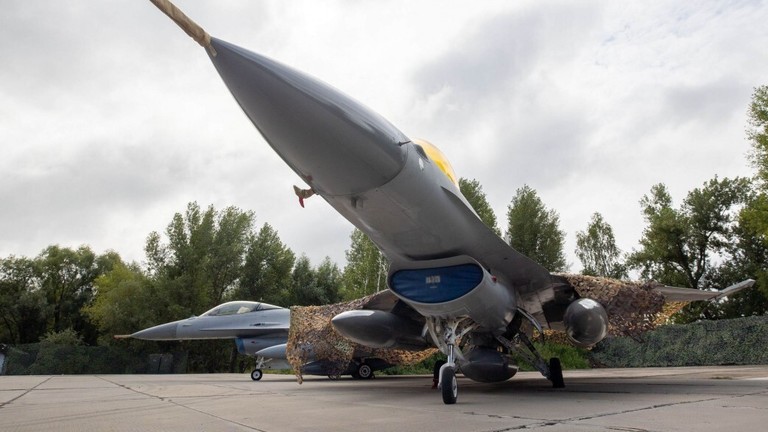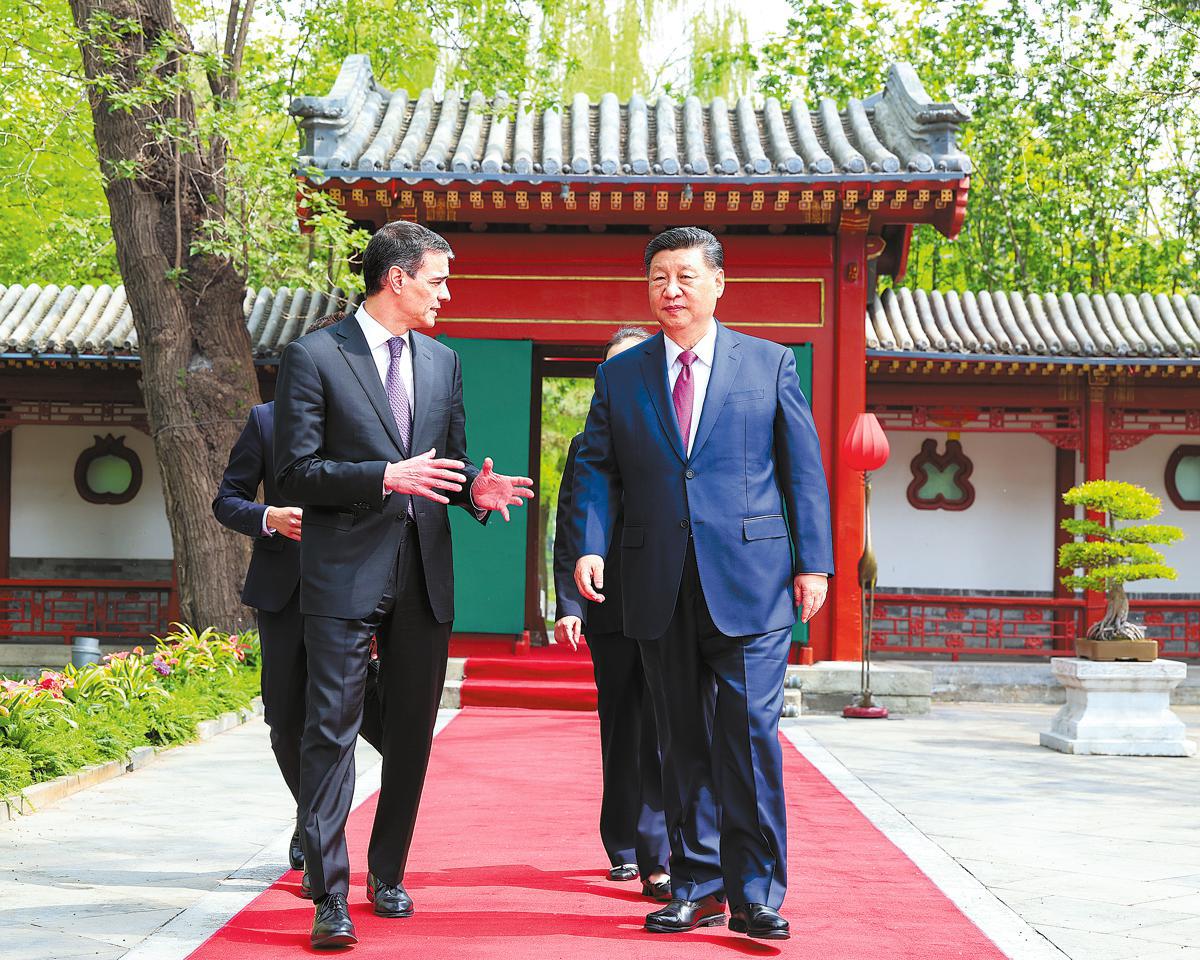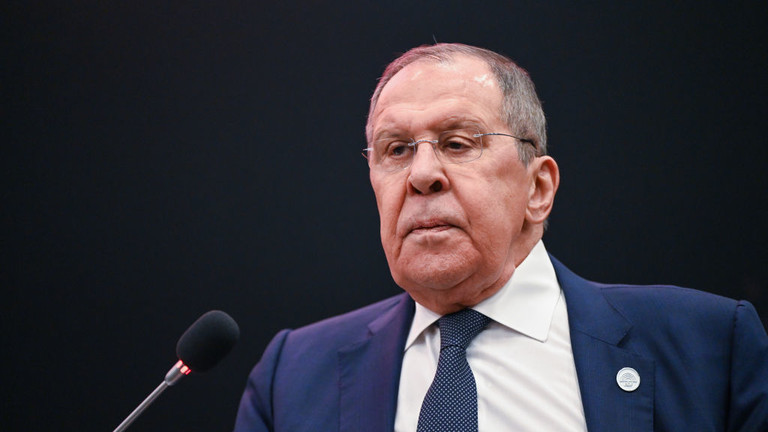No winner in a tariff war - Xi Jinping
President Xi Jinping meets with Spanish Prime Minister Pedro Sanchez at the Diaoyutai State Guesthouse in Beijing on Friday. Liu bin/Xinhua
There are no winners in a tariff war and China is not afraid of unreasonable suppression, President Xi Jinping said on Friday, calling on the European Union to work with China to jointly resist unilateral bullying.
Xi made the remarks during a meeting in Beijing with Spanish Prime Minister Pedro Sanchez, the first time the Chinese leader has spoken in public on the tariff war launched by the United States on April 2.
There is no winner in a tariff war and going against the world ultimately results in self-isolation, Xi said.
He emphasized that China's development over the past 70 years and more has been through self-reliance and hard work, never on others' mercies, and it certainly does not fear unreasonable suppression.
Whatever changes may take place in the external environment, China will remain confident, resolute and focused on running its own affairs effectively, Xi said.
The president noted that both China and the EU are major world economies and staunch supporters of economic globalization and free trade, with their combined economic output accounting for over one-third of the global total, forming a deep economic interdependence.
China and the EU should fulfill their international responsibilities, jointly uphold the trend of economic globalization and the international trading environment, and resist unilateral bullying in order to safeguard their legitimate rights and interests, while upholding international fairness and justice and maintaining international rules and order, Xi said.
Xi's remarks came as the US tariff war with China escalates. The White House clarified on Thursday the 125 percent tariffs on Chinese imports announced on Wednesday were on top of a previous 20 percent, adding up to a whopping levy of 145 percent against China.
In response to a question about the US tariff hike, Foreign Ministry spokesman Lin Jian said on Friday that China's countermeasures are not only aimed at safeguarding its legitimate rights and interests, but also at upholding international rules and order. "In the face of US bullying and arrogance, there is no way forward through compromise and concession," Lin said at a regular news conference.
Sanchez was the first European leader to visit China following the US announcement of sweeping tariffs. The two-day official visit, starting on Thursday, marks his third trip to China within three years.
He told Xi that China is an important partner for the EU, and Spain consistently supports the stable development of EU-China relations.
The EU remains committed to open and free trade, is dedicated to upholding multilateralism and opposes unilateral tariff increases, Sanchez said, adding there are no winners in a trade war.
Faced with a complex and challenging international situation, Spain and the EU are willing to strengthen communication and cooperation with China, uphold the international trade order, and jointly cope with the challenges of climate change and poverty to safeguard the common interests of the international community, he said.
On Friday, Premier Li Qiang held talks with Sanchez. They witnessed the signing of an array of cooperation agreements in the economy, trade, and science and technology.
Both sides issued an action plan (2025-28) on strengthening their comprehensive strategic partnership. They agreed to enhance cooperation on the economy, trade, investment and technological innovation, and jointly support free trade and open cooperation and uphold multilateralism.
China and the EU have been closely coordinating on trade issues over the past few days.
Premier Li held a phone call with European Commission President Ursula von der Leyen on Tuesday, with both sides pledging to promote bilateral ties and uphold the multilateral trading system.
Commerce Minister Wang Wentao held a video meeting with European Commissioner for Trade and Economic Security Maros Sefcovic on Tuesday, during which the two sides agreed to promptly initiate consultations to thoroughly discuss market access-related issues.
Observers said that the US tariff war may provide an opportunity to bring Brussels and Beijing closer together and has given China the opportunity to position itself as a potentially more reliable partner for the EU.
Cui Hongjian, professor of the Academy of Regional and Global Governance at Beijing Foreign Studies University, said that it is imperative for China and the EU to jointly confront this challenge, as US unilateral policies would severely damage globalization and the multilateral trading system that underpins China-EU cooperation.
‘Not good for China’ to retaliate over tariffs – White House
The White House has warned China that further retaliation through tariff hikes would not serve Beijing’s interests, as the world’s two largest economies clash over trade.
Press secretary Caroline Leavitt has stated that over 75 countries reached out to US President Donald Trump’s administration to initiate trade talks, a sign that Washington’s tariff policy is working, she argued.
“The phones have been ringing off the hook to make deals,” she said on Friday during a press briefing at the White House. “These countries wisely heeded President Trump’s warning not to retaliate… and were rewarded with a 90-day pause and substantially lower reciprocal tariff rates,” she added.
In early April, Trump imposed a universal 10% tariff on all imports and higher “reciprocal” tariffs on select countries to promote domestic manufacturing and address trade imbalances. While most elevated tariffs were paused for 90 days, China was excluded from this reprieve. The total tariff on Chinese goods has been hiked to 145%. In response, China imposed a 125% tariff on US imports, while criticizing Washington’s actions as “economic bullying” and warning that continued escalations would render the US a “joke” in global economic history.
When asked directly about China, Leavitt reiterated Trump’s stance. “The tariff rate on China remains where it was yesterday at the 145 percent level,” she confirmed.
Beijing has signaled that its recent tariff hike might be the last, and that further increases would not make economic sense.
When asked if this meant China was backing down, Leavitt said the US president had made it very clear that “when the United States is punched, he will punch back harder.”
Leavitt said the administration remains open to negotiations, claiming Trump would “be gracious if China intends to make a deal with the United States,” but added without elaborating, “If China continues to retaliate, it’s not good for China.”
She also rebuffed critics who said the US administration had not pushed China hard enough with tariffs, saying “Trump is finally taking bold and courageous action.” She added that both Democrats and Republicans have talked tough on China for years, but “no other president had the courage, the work ethic, or the stamina to take on such a task.”








